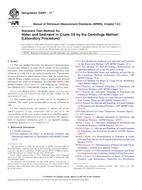We need your consent to use the individual data so that you can see information about your interests, among other things. Click "OK" to give your consent.
ASTM D4007-11e1
Standard Test Method for Water and Sediment in Crude Oil by the Centrifuge Method (Laboratory Procedure) (Includes all amendments And changes 7/12/2016).
Automatically translated name:
Standard Test Method for Water and Sediment in Crude Oil by the Centrifuge Method (Laboratory Procedure)STANDARD published on 1.6.2011
The information about the standard:
Designation standards: ASTM D4007-11e1
Note: WITHDRAWN
Publication date standards: 1.6.2011
SKU: NS-25711
The number of pages: 13
Approximate weight : 39 g (0.09 lbs)
Country: American technical standard
Category: Technical standards ASTM
The category - similar standards:
Annotation of standard text ASTM D4007-11e1 :
Keywords:
centrifuge, centrifuge tube, crude oil, laboratory procedure, sampling, sediment and water, solvent, ICS Number Code 75.040 (Crude petroleum)
Additional information
| Significance and Use | ||||||||||||||||||||
|
The water and sediment content of crude oil is significant because it can cause corrosion of equipment and problems in processing. A determination of water and sediment content is required to measure accurately net volumes of actual oil in sales, taxation, exchanges, and custody transfers. It is not anticipated that this test method, which is written with a dedicated laboratory facility in mind, is likely to be used in field test rooms or sample rooms due to safety concerns for proper ventilation and handling. This test method may not be suitable for crude oils that contain alcohols that are soluble in water. In cases where the impact on the results may be significant, the user is advised to consider using another test method, such as Test Method D4928 (API MPMS Chapter 10.9). |
||||||||||||||||||||
| 1. Scope | ||||||||||||||||||||
|
1.1 This test method describes the laboratory determination of water and sediment in crude oils by means of the centrifuge procedure. This centrifuge method for determining water and sediment in crude oils is not entirely satisfactory. The amount of water detected is almost always lower than the actual water content. When a highly accurate value is required, the revised procedures for water by distillation, Test Method D4006 (API MPMS Chapter 10.2) (Note 1), and sediment by extraction, Test Method D473 (API MPMS Chapter 10.1), shall be used. Note 1—Test Method D4006 (API MPMS Chapter 10.2) has been determined to be the preferred and most accurate method for the determination of water. 1.2 The values stated in SI units are to be regarded as standard. The values given in parentheses are for information only. 1.3 This standard does not purport to address all of the safety concerns, if any, associated with its use. It is the responsibility of the user of this standard to establish appropriate safety and health practices and determine the applicability of regulatory limitations prior to use. Specific warning statements appear in 6.1, 8.3, and A1.5.4. |
||||||||||||||||||||
| 2. Referenced Documents | ||||||||||||||||||||
|
Similar standards:
Historical
1.5.2014
Historical
1.10.2013
Historical
1.12.2012
Historical
1.6.2011
Historical
1.5.2011
Historical
1.10.2010
We recommend:
Technical standards updating
Do you want to make sure you use only the valid technical standards?
We can offer you a solution which will provide you a monthly overview concerning the updating of standards which you use.
Would you like to know more? Look at this page.



 ASTM D4929-07(2014)..
ASTM D4929-07(2014).. ASTM D5002-13
ASTM D5002-13 ASTM D5708-12
ASTM D5708-12 ASTM D5853-11
ASTM D5853-11 ASTM D5863-00a(2011)..
ASTM D5863-00a(2011).. ASTM D6377-10
ASTM D6377-10
 Cookies
Cookies
